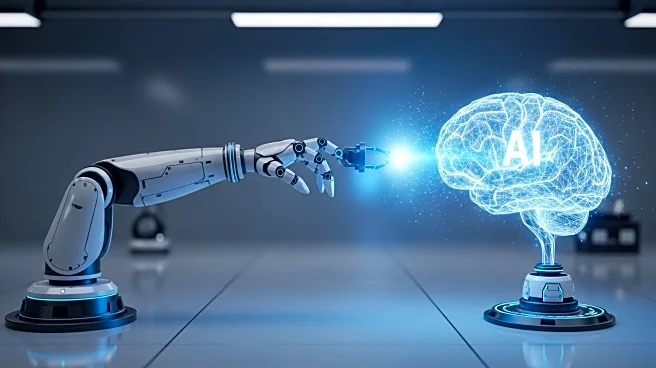What's Happening?
John Callahan, CTO and president of AI company Partsol, highlights the challenges posed by artificial intelligence (AI) in the workforce. While AI has enabled employees to reallocate time-consuming tasks and improve work efficiency, it also presents risks, particularly in cybersecurity and job security. Callahan emphasizes that the real challenge lies in companies adopting AI without a clear strategy or understanding of their business needs. Many firms have scaled AI integration too quickly, leading to underwhelming results and a lack of internal expertise. This has resulted in wasted investments and missed opportunities to grow AI capabilities. Callahan argues that the risk is not AI replacing jobs en masse, but rather professionals becoming unequipped to work in an evolving environment. He stresses the importance of investing in people and taking a strategic approach to AI integration to remain competitive.
Why It's Important?
The integration of AI into the workforce has significant implications for U.S. industries and the economy. Companies that fail to strategically implement AI risk falling behind in competitiveness, potentially leading to economic losses. The workforce must adapt to new roles and skills, such as AI safety testers and ethics specialists, to thrive in the digital age. This shift requires investment in education and training to ensure professionals are equipped to handle AI-driven changes. The potential for job displacement in sectors like finance highlights the need for a balanced approach that leverages human strengths, such as creativity and emotional intelligence, alongside AI capabilities. Successfully navigating these challenges can lead to innovation and a more skilled workforce, benefiting both businesses and employees.
What's Next?
Organizations are expected to reassess their AI strategies to ensure alignment with business goals and workforce capabilities. This may involve increased investment in training programs to equip employees with necessary AI skills. Companies that embrace AI as a tool for career progression and innovation are likely to gain a competitive edge. The focus will be on creating a resilient workforce that can adapt to technological advancements. As AI becomes more integral to work, removing barriers to access and education will be crucial in building a workforce capable of thriving in the digital age. Stakeholders, including business leaders and policymakers, will need to collaborate to address these challenges and opportunities.
Beyond the Headlines
The ethical implications of AI integration in the workforce are significant. Ensuring AI tools remain safe, fair, and effective requires roles that combine technical skills with human judgment. The rise of AI also prompts discussions on digital literacy, AI ethics, and sustainability. Companies that fail to address these aspects risk stalling workforce development and innovation. Embracing AI as a partner rather than a threat can lead to a more fulfilled and skilled workforce, driving long-term economic growth and societal benefits.










